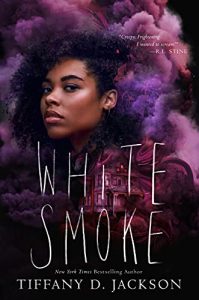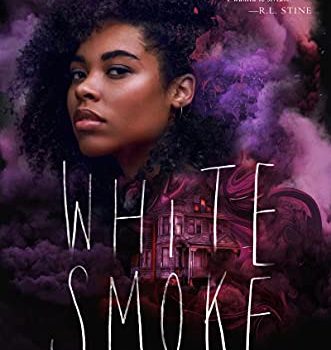Alex Brown Reviews White Smoke by Tiffany D. Jackson
 White Smoke, Tiffany D. Jackson (Katherine Tegen Books 978-0063029095, $18.99, 384pp, hc) September 2021.
White Smoke, Tiffany D. Jackson (Katherine Tegen Books 978-0063029095, $18.99, 384pp, hc) September 2021.
After her public collapse and a stint in rehab, Marigold, a Black high school track star, is finally getting a second chance. When her artist mom gets a once-in-a-lifetime opportunity for a residency that comes with a free house, Mari, her mother, brother, step-father, and step-sister move from coastal California to a rundown Midwestern town. Though her family is blended, it’s anything but comfortable. Her younger brother Sammy misses their father, her white step-father is oblivious to all but the most obvious sources of racial tension, and her 10-year-old step-sister, Piper, has already learned she can get away with playing the victim and blaming her Black stepsister for everything. The Anderson family’s fresh start is weighed down with too much emotional baggage, a situation that quickly gets worse as they settle into their new life.
Cedarville has seen better days. Most of the homes in their neighborhood are rundown or abandoned. Squatters hide in empty homes, and the neighbors are suspicious from the jump. Rumors fly about the monster that terrorizes the burned-out homes, and the aftermath of past riots stain the landscape. Almost immediately, Mari realizes something is wrong in their new home. The property owners, a white couple with plastic smiles, have forbidden them from entering the basement and are plotting some shady development deals. Things go missing or turn up in unexpected locations. Piper, meanwhile, starts talking to someone – or something – only she can see. Most of Mari’s energy is focused on trying to find a weed connection in town, so she can continue self-medicating her anxiety, but her choices soon catch up to her in dangerous ways. Something evil is lurking in Cedarville, and Mari is about to come face to face with it whether she wants to or not.
White Smoke, the latest from the impressively talented young-adult author Tiffany D. Jackson, is a sharp, shudder-inducing new YA horror novel. It bristles with tension from the first page to the last. At first, Jackson follows the standard rules of a haunted house story. She sprinkles in scares and shocks with increasing frequency and intensity, driving Mari to question her sanity and lash out at those closest to her. Making things worse are Mari’s anxiety and drug dependence issues. Is what she’s experiencing real or gaslighting? Or both? I don’t read much horror – it’s too scary! – so there has to be a big draw to get me to set aside my aversion to stress. In this case, the premise and the author were too enticing. I’m so glad I didn’t resist. It was just horriifying enough to keep me on the edge of my seat but not enough to gross me out or give me nightmares.
The way Jackson handles Mari’s anxiety and addiction is nuanced and evocative. I have anxiety and work with many teens who do as well. Good anxiety representation means not shying away from the messiness of it all and how it can override your common sense and logic until it’s all-consuming. For Mari, hers stems from trauma involving bed bugs. The thing about anxiety is that even if you look fine on the outside, your mind can be spiraling out of control on the inside. Although you may be engaged in other activities, you’re also constantly thinking about the things that trigger your anxiety, like having a pot simmering on the back burner of a stove. Readers follow along with Mari as she attempts the tightrope walk of managing triggers and anxiety attacks. Mari’s experiences felt very real to me in their complexities and contradictions.
Drug addiction and dependence aren’t easy conversations to have in young adult fiction, but they’re ones we desperately need to have. Through Mari’s interactions with friends and family, Jackson digs into the reasons a person might self-medicate and what happens in the aftermath of drugs taking over a community. There are thoughtful discussions about the underlying causes for Mari’s over-reliance on weed, how the War on Drugs is really a War on Black People, and how the prevalence of drugs in a downtrodden community is usually a symptom of larger systemic problems.
Cedarville, like the rest of the country, uses ludicrously punitive anti-drug laws to target Black communities, while simultaneously allowing white-owned weed industries to flourish. Mari’s drug dependence brings this disparity into stark contrast and complicates matters with her new friends. Some see weed as a fun time, some as a way to cope with seemingly impossible situations, some as a thing to fear, and some as a thing to hate. Each perspective is treated with respect and given room to change as time goes on. This is not a story where marijuana is either condoned or condemned. Being reductive serves no one, and Jackson is never one to pick the easy option.
The ending of White Smoke was, for me, one of the best parts of the novel. As readers, we’re trained for resolutions. With a standalone, we expect most of the threads to be neatly tied off and the arc completed. There is some resolution here, but not in the way a reader might expect. Given the topics Jackson is dealing with, a pat ending would do a disservice to the characters and the readers. Mari’s literal antagonist is the being haunting her house, but the real villain is the racist systems that created the antagonist in the first place. No novel could or should even try to solve four centuries of oppression. The ending may not be what every reader wants, but it’s the best ending the book could have. Personally, I thought it was narratively and emotionally satisfying even as it left a lot of questions unanswered.
I didn’t expect it going in, but I was pleased to discover how much White Smoke has in common with Alyssa Cole’s 2020 novel When No One Is Watching. Both are set in formerly thriving Black neighborhoods that are now struggling due to external forces beyond their control. Both feature Black women made to feel powerless by systems designed to oppress and disenfranchise. Both also tackle gentrification, mass incarceration, police brutality, corruption and collusion between the privileged and the powerful, do-nothing white moderates, and the specific kind of gaslighting that happens when BIPOC push back against racist microaggressions. Where Cole takes her story into thriller territory with a sprinkling of science fiction and romance, Jackson leans into horror. Importantly, each author takes the tropes of their respective genres and mines the depths to find the dark truths. For Jackson, this is more than a story about a haunted house and a tormented young woman. It’s about what happens when the ghost and her target are Black women caught in the machinery of white privilege.
Tiffany D. Jackson is known for her hard-to-put-down young adult thrillers, and with White Smoke she proves she can take on horror, too. Creepy crawlies, haunted houses, and all-powerful evil forces burst from the page. Teen readers especially will find a lot to love in this novel. Jackson tells one hell of a scary story.
This review and more like it in the October 2021 issue of Locus.
 While you are here, please take a moment to support Locus with a one-time or recurring donation. We rely on reader donations to keep the magazine and site going, and would like to keep the site paywall free, but WE NEED YOUR FINANCIAL SUPPORT to continue quality coverage of the science fiction and fantasy field.
While you are here, please take a moment to support Locus with a one-time or recurring donation. We rely on reader donations to keep the magazine and site going, and would like to keep the site paywall free, but WE NEED YOUR FINANCIAL SUPPORT to continue quality coverage of the science fiction and fantasy field.
©Locus Magazine. Copyrighted material may not be republished without permission of LSFF.








